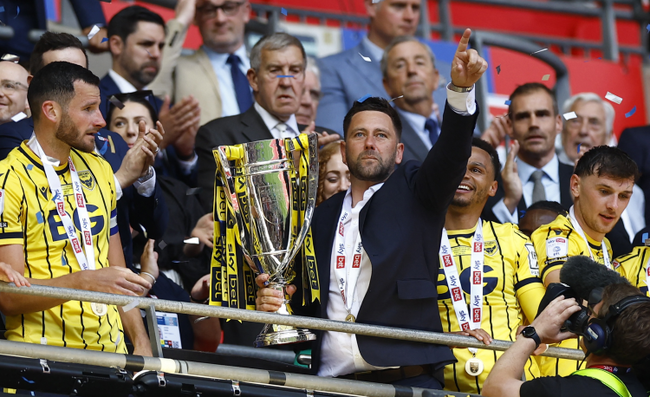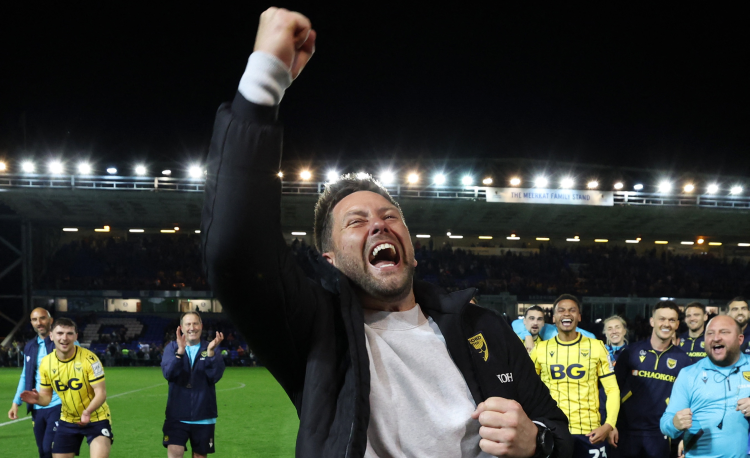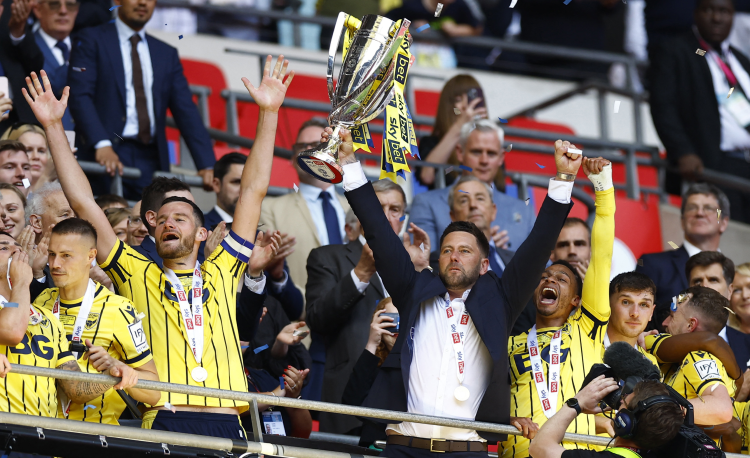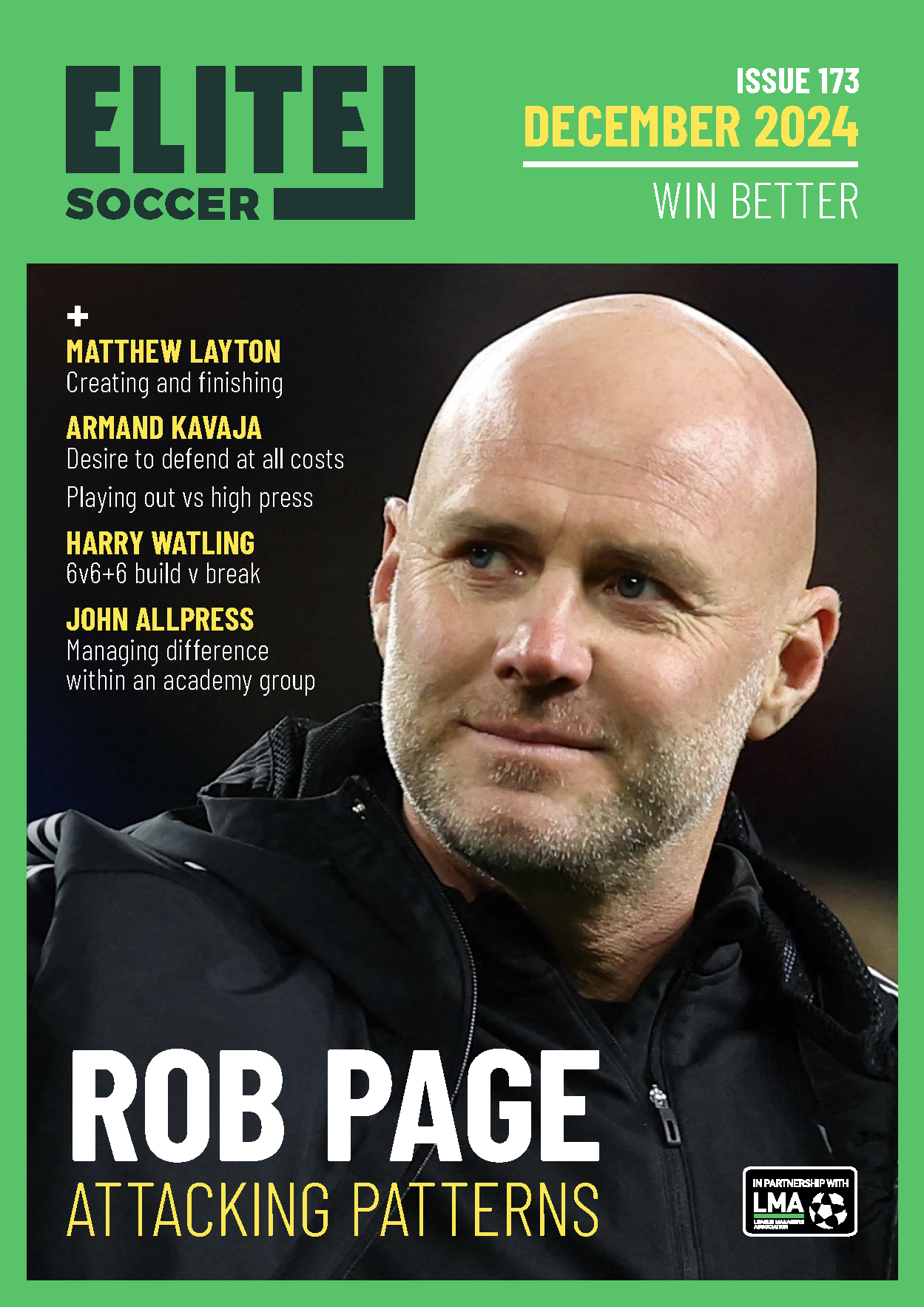You are viewing 1 of your 1 free articles
Spotlight on: Des Buckingham, Oxford United
The Oxford United head coach talks to Ben Bartlett about his career journey so far, steering his team through the play-offs, and the fresh challenge of the Championship
After a coaching career that has taken him to New Zealand, Australia and India, Des Buckingham is now in charge of hometown club Oxford United – leading them to promotion glory last season
Buckingham on his incredible global career path
I wanted to be a head coach so I was trying to look for a job spec rather than an actual job role. A job came up as football development manager for the New Zealand FA, and it ticked every single box when I looked at what I thought I was going to need to be a head coach: managing staff, looking after budgets, managing up as well as down. Although it wasn’t a coaching role, the exposure to what those things I thought would give me the tools to be better as a coach. At the time I didn’t have a mortgage, didn’t have a partner, didn’t have any kids. I’d grown up in Oxford for 29 years, and I thought, ’If I don’t take this opportunity now, when I look back at it I’ll always regret not going.’
So I did. I jumped over. I worked for the FA over there for a year, and then a job opportunity came up at Wellington Phoenix in the A League to come in as an assistant coach to Ernie Merrick, and I was fortunate to spend three years working with him. The way he developed me as an assistant coach, he was priming and preparing me to be a head coach without me recognising or realising it. When I look back at it now, the skill that he had to do that without making you acutely aware of it really helped when the opportunity came up at Wellington, when he stepped aside mid-season, and I got the chance to lead the club and finish off the season.
After that, Gareth Jennings, who I’d worked with at Oxford, was now the academic manager at Stoke City, and they were looking for an under-23s coach. At the time Stoke were in the Premier League and I thought it was a good challenge to come in and work with firstly a higher calibre of player but also within an environment that would have good people, good structure, good process that would challenge me and maybe give me a bit more exposure to get better quicker.
Then I got the opportunity to go back to New Zealand, this time as a national team head coach. There’d been a change in the four-year cycles from World Cups in the senior space. The head coach had left, and they were looking to recruit and restructure a whole new staff and set-up in New Zealand, and asked me to be head coach of the under-20s and be assistant coach to the senior team as well.
“You have to step back and understand what you’re looking at before you can see where you can add some value”
I had three wonderful years there with the national teams. We qualified for the Under-20 World Cup and the Olympics, although I unfortunately didn’t get the chance to take the team to the Games because of COVID, which also led to another restructure, leaving me out of work for the first time in 15 years.
I was then picked up by City Football Group. I’d done my master’s degree in coaching at the University of South Wales with a tutor called Ceri Bowley who was working at City Football Group and had been tasked with setting up a framework to look at the types of players they want to bring into their system. He got in touch with me and said he would like to involve me with their set-up, and the first opportunity to do that come up in Melbourne, to go in and support a first-time head coach, but they felt the skill set of both myself and the new head coach would work well together and would benefit the group of players. I spent 18 months in Melbourne, and we won the double that first season, the first time they’ve ever done that.
Growing up in England, I’d only known one way of really working, and six years in New Zealand, and then that time in Australia, really opened my eyes. You have to try and step back and understand it before seeing where you can add some value. That certainly was the case then when the opportunity came to go to India. Mumbai was another City Football Group club, and I was asked to set it up in the same way that Melbourne is set up both on the field and behind the scenes as well. I’d never thought about visiting India on holiday, let alone going to work there, but I’m so glad I did because I spent two and a half years there. The experiences that I’d had both in New Zealand and Australia in terms of recognising cultural difference, recognising different religion, understanding that there are many ways to get to an end outcome and how to involve people in that journey, the ability of building relationships and trust in others, and working with others to go far further than I could take them myself: all those things came together in Mumbai.
Oxford United were then looking for a head coach in autumn 2023, and I had a lot of contacts still here, and they kept a track of the work that I’d been doing. They got in touch and said would it be something of interest?
Bear in mind the journey I’d been on. I hadn’t seen my family. I’d been away from a lot of people for a long period of time, nine years. The fact it’s your hometown club, the vision that they set out with the owners, where they want to be, how they want to get there and how they want to do it, it really closely aligned with how I want to work and what that looks like.
Oxford United
EST. 1893
Overview
League: Championship
Head coach: Des Buckingham
Location: Oxfordshire, England
Ground: Kassam Stadium
Capacity: 12,573
Buckingham on Oxford’s club culture
I know how important this club is to the area. I was a fan back in 2010 when we went up to Wembley, the last time we went up into the Football League. My friends are fans, my family are all fans, I’m a fan.
The impact this club has on the people around Oxford is huge. But I try not to get caught up in that. Instead, I concentrate on having a way we want to play. We’ve got a way that we talk about brand and identity. We’ll try to do that in the Championship this year.
I don’t want to be a coach that tries not to lose games. We’ve got a way that we want to work. We have to be smart about how we do that, both technically, tactically and in game, and we need to make sure we recruit players to play the style of football we want. It’s just being clear on what we’re doing, how we do it, and more importantly, how the people in this building, both staff and players, contribute to it. that great success of where we’re going.
Buckingham on managing change
[Former manager] Liam [Manning] got the club into a wonderful position. Often when you come into a club, something hasn’t quite gone right, whereas in this case, things have gone well, and the guy that’s been leading that process is now gone. The first thing was to take a step back and have a look at what was working well and how it worked, more importantly, because although I’ve got my way, I want to play in a way that I want to work. If it’s gone well, there will be a transition period, but what does that transition period look like and how long do we need to do it? The last thing I want to do is come in, throw it all away, and then try and implement my stuff, because that would just be stupid.
“We’ve got a way that we want to work but we have to be smart about how we do that”
In that transition period, it was messy. Liam had the team set up fantastically well in the defensive block, sat deep, sat compact. As a result, they didn’t concede many goals, didn’t concede many chances on goal, and would generally break from deep areas. It was a strategy that worked really well to get them where they were. The way I want to play isn’t that. It’s to try and make us a lot more aggressive. I want us to press teams.
The players were, I’ve no doubt, looking at me, going, ‘Who are you? You’ve got no track record in England at all!’ They were still trying to work me out while I was trying to gain their trust. That becomes messy in terms of learning and trying out new things in games.
Buckingham on players’ learning through the 2023/24 season
The players are a strong group. They stuck together. People were saying, ‘OK, you’ve turned teams over but they’re down the bottom end of the table, but you haven’t been able to do that against teams that are going to be competing for a promotion. Will you be brave enough to do that against them?’
Looking at the internal measures, but also looking at the work that we’d done that encompassed those games, we felt the players were in a much better place before we played Peterborough [in April], and when we checked and challenged them on certain things, they actually wanted to do it because they’d seen the rewards of it. Before the game, we lost our captain, Elliot Moore, who’s a big influence in terms of playing out from the back, centre back, and we lost Cam Brannagan, who is one, if not the best midfield player in the league.
But because of the way that we’d gone about involving players in the process, it wasn’t just about an 11, it was about positions and being clear on what we wanted from those players. We brought in Sam Long at centre back and Josh McEachran, who is a good player, but hadn’t played very much.
And we flew out the traps, we pressed them aggressively, and we won the game 5-0. If they weren’t sure before, that was the moment. We didn’t want to throw out the old with the new; we knew the deep block that Liam had worked on, we were capable and good at doing it, but we now had another way of playing out of possession. We got to a stage where going into the [play-off] semi-finals against Peterborough, it become almost a chess match against them. We didn’t know how they would come out, but what we knew was we were capable of pressing them at certain times if we needed to.
We’re also capable of sitting back in a deep block. We’re also capable now in terms of implementing this playing style. If they pressed a certain way, we had different solutions to getting out of that. They were tested massively over those two legs in the semi-final.
Oxford United’s road to the championship
EST. 1893
Semi-final first leg: May 4, 2024, Kassam Stadium, Oxford United 1-0 Peterborough United
Semi-final second leg: May 8, 2024, London Road, Peterborough United 1-1 Oxford United
Final, May 18, 2024: Wembley, Bolton Wanderers 0-2 Oxford United
Buckingham on winning the play-off final
If you were going to write a game plan for a final, it couldn’t have gone much better. We spoke about identity. We had a way we want to press. Our press is probably 70 percent set and it’s got some degree of bend and flexibility, but not to a point where we’re going to lose ourselves. That’s been the message we’ve been trying to push through. If we’re going to build a brand, this is who we are. I don’t care if you’re one of the best teams in the leagues or one of the lower teams in the league: we do what we do and if we lose games, we lose them playing our way.
If we win games, we know how we won them. We had some bend against Bolton and we changed our pressing structure, but we didn’t lose ourselves within doing that. The players bought into it from the start because we’d ended up going through this journey. They were so invested in it – and obviously the motivation behind winning at Wembley carries its own weight.
Related Files
Buckingham on the challenge of the Championship
We’ve got a really clear way of what we do with the ball. We’ve got a really clear way of what we do without the ball. Because we’re clear on how we want to play, to an extent, we can be really specific about the types of players that we try and recruit to play that style. That won’t change. What we want to do is we want to get better at doing that. We’ve got an identity that is, again, at the moment, foundation level, but there are foundations we can now add and build to, and we need to add and build to that with recruitment because we’ve got a good group here that will look to complement both quality and experience, but we’ll also need to continue to do what we did at Wembley against Bolton. We know we’re going to come up against teams that have got far greater resource and potentially better players and have got more experience of the league, but tactically, how we set up and our in-game management, we need to get spot on.
When I came here, the project that was put in front of me, it was about becoming a Championship club and then becoming a sustainable one, and we’ve probably arrived there a bit sooner than we thought, which has allowed us to move a little bit quicker.
I want us to be who we are – and that’s the approach we’re trying to take.
Editor's Picks
Using the goalkeeper in build-up play
Pressing principles
Intensive boxes drill with goals
Penetrating the final third
Creating and finishing
My philosophy
Pressing initiation
Compact team movement
Defensive organisation
Coaches' Testimonials

Alan Pardew

Arsène Wenger

Brendan Rodgers

Carlos Carvalhal

José Mourinho

Jürgen Klopp

Pep Guardiola

Roy Hodgson

Sir Alex Ferguson

Steven Gerrard
Coaches' Testimonials

Gerald Kearney, Downtown Las Vegas Soccer Club

Paul Butler, Florida, USA

Rick Shields, Springboro, USA

Tony Green, Pierrefonds Titans, Quebec, Canada
Join the world's leading coaches and managers and discover for yourself one of the best kept secrets in coaching. No other training tool on the planet is written or read by the calibre of names you’ll find in Elite Soccer.
In a recent survey 92% of subscribers said Elite Soccer makes them more confident, 89% said it makes them a more effective coach and 91% said it makes them more inspired.
Get Monthly Inspiration
All the latest techniques and approaches
Since 2010 Elite Soccer has given subscribers exclusive insight into the training ground practices of the world’s best coaches. Published in partnership with the League Managers Association we have unparalleled access to the leading lights in the English leagues, as well as a host of international managers.
Elite Soccer exclusively features sessions written by the coaches themselves. There are no observed sessions and no sessions “in the style of”, just first-hand advice delivered direct to you from the coach.







